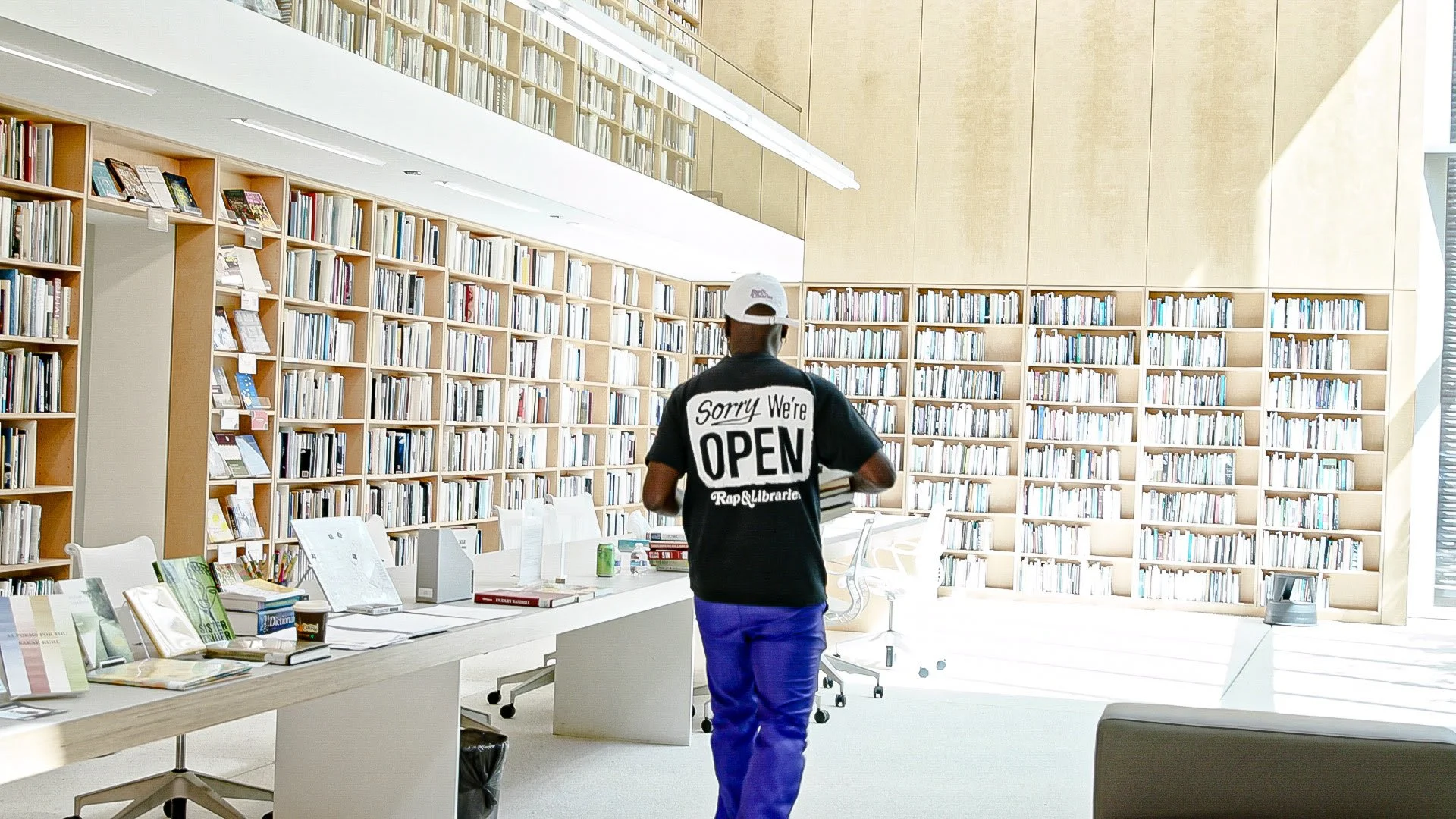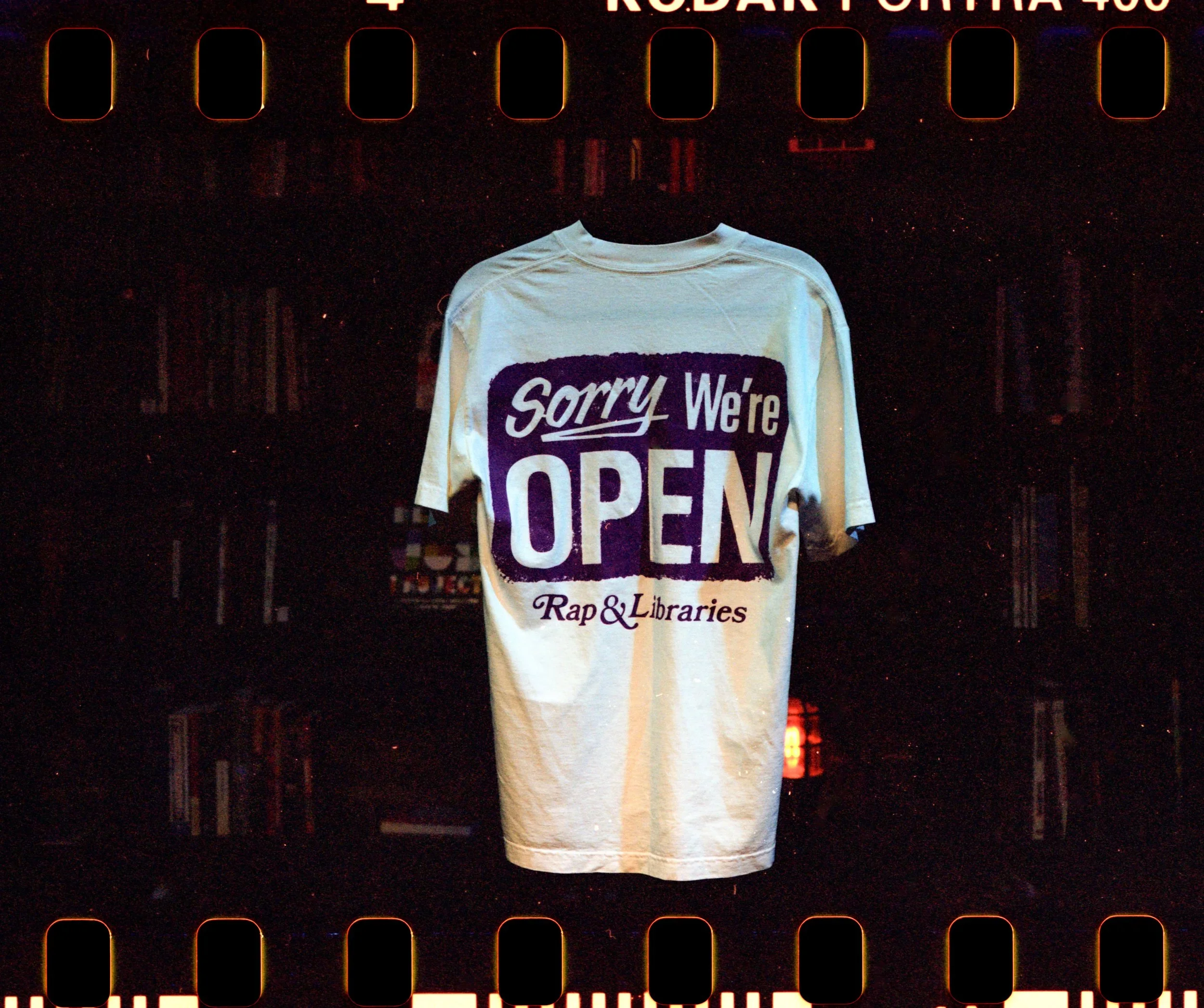RAPBRARIAN: READING CAME FIRST: issue #1
Roy Kinsey walking through the library at Poetry Foundation on the first day of filming.
ONE YEAR OF RAPBRARY.
one year of documenting.
Blue collar. The son of a mother born in Mississippi. Westside is just a cha cha from the south. “Take it back now, y’all.” In one of the finest literary cities and institutions in the nation. The world? Here I am in Chicago’s Poetry Foundation, the place where we began our documentary journey, and where we will celebrate the first anniversary of Rapbrary - “One for the Books.”
For no other reason than to wrap my arms around our stories, audacious and delusional, yet deliberate enough to dream and then chase them. For me, as a rapper, I understood where I desperately needed to strengthen my ego; rap taught me when and where to talk my shit. I had to practice the art of learning to be confident. As a librarian, as a black male librarian, 0.5 percent of the industry, I needed that same ego that empowered me to continue to make music as a queer and gay rapper in a not-so-friendly hip hop industry, on my journey into disrupting the traditional library industry.
My gift is that I see where there are voids. I see the gaps, and I see where I can be impactful with my set of talents and work ethic. Like empty spaces on library shelves where our stories once lived, I recognized the threat, the assault, the omissions from the story. On my 4th album Blackie: A Story by Roy Kinsey (2018), an offering, a eulogy to my late Grandmother, Helen Thompson, I wondered why the Great Migration hadn’t been mentioned in Hip Hop. The stories I found in books were not on any records I knew, and I double and triple-checked before making this claim. Hip Hop, “the Black Man's CNN,” a phrase from Public Enemy’s Chuck D, and I wanted to know why. I research for every album I create. Less critical now than I was during my Saturn Return, I imagine so many rappers may not have been aware of our collective histories coming from the south, or didn’t know or feel the need to turn that history into a record. Record as a sound recording, and record as an archive.
In the library world, librarians are affectionately called “authorities.” In my Rubik’s Cube-type existence, it wasn’t until I locked in to, not the little the Western world had for people like me, but what I’d put together, like my history, our gifts, my talent, and intuition, that life began to make sense. I’m getting a bit esoteric now, so I digress.
Simply put, God told me to create Rapbrary as a contribution to my ancestors, past and future generations, and to document the journey. Ancestors, whether by blood or affinity, told me to build a special library that honors our culture, and keep our stories safe for those in need in the present and future. In 2023, I talked with my designer, Uriel Velasco, in a call that began with me commissioning him to design logos for some T Shirts and other merch I had for something I’d call the Rapbrary. In this call, we discussed Brand Identity, deliverables, and assets, and on these hour-long calls, Rapbrary was whispering to me that it was more than a T Shirt, but a calling and a mission.
We came up with Sorry We’re Open, an attitude that directly spoke to what our mission was as a Book Sanctuary. As an authority in librarianship and hip hop, I dare to say that our poetry, our raps, are fine art, and need to be revered and protected as any other precious artifact and culture would require protection. I’d bang my head against the wall trying to navigate the library industry, trying to find myself, until I surrendered the need to fit in, and realized there was no true fitting in in a field made up of predominantly white women did not have me in mind. So yes, Rapbrary is rebellious considering how these spaces are often problematic for black folks when reflecting on anti-literacy laws, segregation in libraries, and the effect of information when black folks are but a sliver of professionals that make up the library industry. I’ll never forget reading a story on the segregation of libraries in the South. It was common practice that if a library system found that a book went out on interlibrary loan to a black patron, once returned, the librarians would throw the book away entirely. Beyond ignorant segregation has always been very wasteful.
This is the first of four issues of this visual journal I’m releasing as a part of my OTV atlas ambassadorship. Check back next time for issue # 2, speak it into existence, covering the early beginnings of the Rapbrary, where books were first gathered at Semicolon Bookstore on Juneteenth 2024, and celebrates Black literature as both a survival tool and a legacy, framing it as a communal, liberatory practice that equips future generations with purpose, resilience, and self-love. It’s about honoring the power of stories—our archives, our records—as love letters and roadmaps for Black survival, freedom, and futurity.


